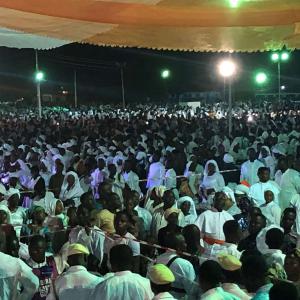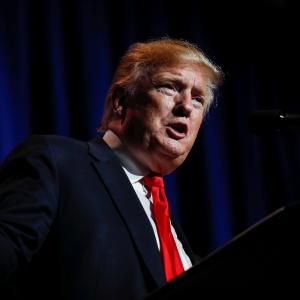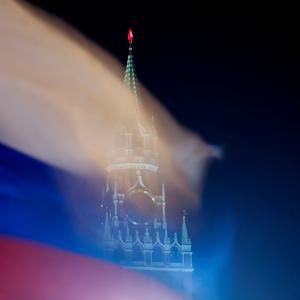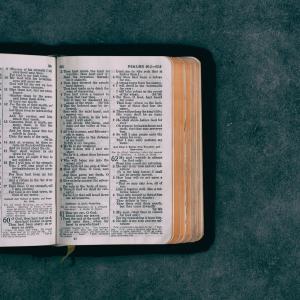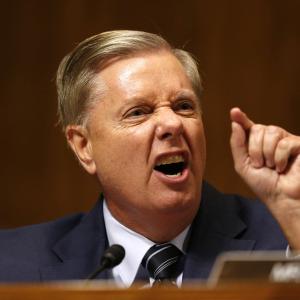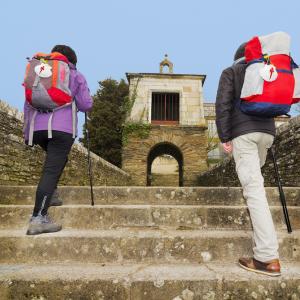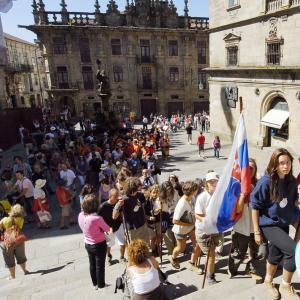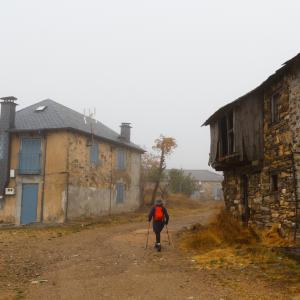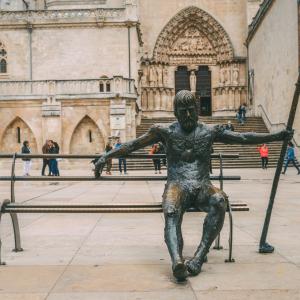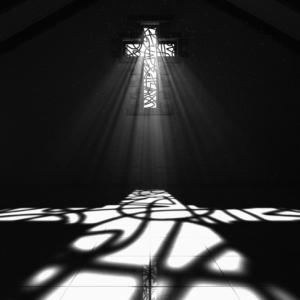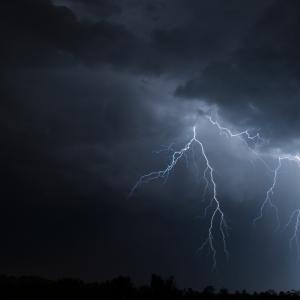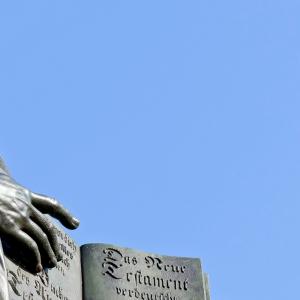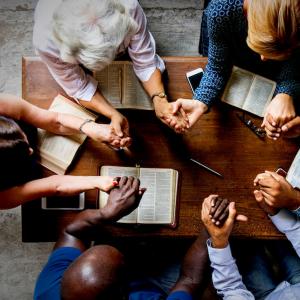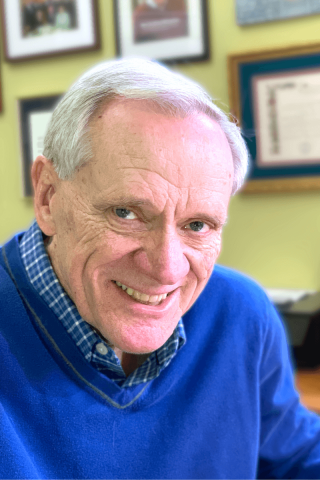
Wes Granberg-Michaelson is a contributing editor to Sojourners. His forthcoming book is The Soulwork of Justice: Four Movements of Contemplative Action (Orbis Books).
His other books includeing Without Oars: Casting Off into a Life of Pilgrimage, From Times Square to Timbuktu: The Post-Christian West Meets the Non-Western Church, and Future Faith: Ten Challenges for Reshaping Christianity in the 21st Century.
He served as general secretary of the Reformed Church in America for 17 years from 1994 to 2011. Previously he held the position of director of church and society at the World Council of Churches in Geneva. Earlier in his career he served as executive and legislative assistant to U.S. Senator Mark O. Hatfield (1968-1976) and then as the associate editor of Sojourners magazine when it was founded. He played a leading role in establishing Christian Churches Together in the USA, and presently helps guide the development of the Global Christian Forum. Over the course of his ministry his ecumenical work has taken him to all corners of the world. In addition to the recent titles listed above, he is the author of Underexpected Destinations: An Evangelical Pilgrimage to World Christianity and Leadership from Inside Out: Spirituality and Organizational Change, as well as four other earlier books. His numerous magazine articles have appeared in Sojourners, The Christian Century, The Church Herald, Ecumenical Review, and other publications.
In the fall of 2012, Granberg-Michaelson was appointed as a Distinguished Visiting Scholar at the John W. Kluge Center of the Library of Congress. While there he researched and wrote the book From Times Square to Timbuktu: The Post-Christian West Meets the Non-Western Church (Eerdmans, Fall 2013). The book deals with the effects of the shift in world Christianity to the global South, and impact of global migration on congregational life and society in the global North. It was chosen to be part of the 2013 National Book Festival in Washington, D. C.
Granberg-Michaelson is a graduate of Hope College and Western Theological Seminary, both in Holland, Michigan, and was ordained as a Minister of Word and Sacrament in the Reformed Church in America in 1984. Presently he continues his work in ecumenical organizations, in writing and public speaking on issues facing world Christianity, and consulting to church-related organizations. He serves today on the governing boards of Church Innovations and the Global Christian Forum. His wife, Kaarin Granberg-Michaelson, is an ordained minister in the Reformed Church in America, and they have two children. He and Kaarin live in Santa Fe, New Mexico.
Posts By This Author
The Embodied Joy of the Global Church
One year ago this week, I walked into the Cathedral in Santiago de Compostela, Spain, completing my pilgrimage there. This week I witnessed a different pilgrimage as about 100,000 people made their way to Mount Tabieorar, in Ogere Remo, Nigeria. They clothed themselves with white robes, took off their shoes, danced, sang, and prayed through the night and into the early morning with uninhibited joy. This was the 83rd time the Tabieorar celebration has gathered in this holy space.
'Lulled into a Nightmare'
The Mueller report is all but forgotten — its limited focused also not remembered. Mueller’s assignment was to look only at Russian interference in the election and the possibility of a criminal conspiracy with the Trump campaign to assist this. Opponents of Trump labeled this “collusion.” Weeks before the report’s release, I argued that no such conspiracy would be found because none was needed. Putin detested Hillary and his apparatus of political infiltration was smart enough to know how to undermine her campaign. It did.
'No Collusion'
President Donald Trump is convinced he can sweep aside all his high crimes and misdemeanors if Robert’s Mueller’s report finds that Trump never called up President Vladimir Putin and enlisted his help in the election. Whenever the Mueller Report comes out, all Trump wants to do is continue chanting, “No collusion.” He knows that Fox News will join the chorus and expects that the sound of all else will be drowned out, certainly for his base and maybe beyond.
Keeping Hope Alive on the Korean Peninsula
I worshipped at Seoul’s Myungsung Presbyterian Church, the largest Presbyterian church in the world with a membership close to 100,000, and preached at its English-speaking service. At the main Korean worship service I attended (one of five services that they offer each Sunday), I heard prayers for the reunification of Korea at least three or four times, which is a repeated intercession. Moreover, Myungsung is known for its daily prayer services. One of these gatherings that takes place every Monday is focused on praying for re-unification. It has been doing so for 10 years, normally drawing about 3,000 people.
Not a 'White' Christmas
In 1980, for the first time in 1,000 years, more believers following the babe in Bethlehem lived in the global South than the North, and in four decades since then this has accelerated. Growth in Latin America means 600 million exchange “Feliz Navidad,” or “Feliz Natal” (Portuguese) during these days in crowded Catholic cathedrals, megachurches, and Pentecostal storefronts. This is an increase of 10 million in the past year.
My Foolish Hope
White evangelicals hold more extreme, negative views regarding immigrants, refugees, and the prospect of the nation’s racially diverse future, than any other group in the country. It is a devastating indictment of the failure of white evangelicals to live as faithful disciples of Jesus in these crucial areas. Further, it confirms how this group, comprising about 25 percent of those who vote, is a core component of President Donald Trump’s political support, with his angry, racially laden appeals to an exclusive ethno-nationalism.
The Most Disheartening Survey of Voters
Of all the various surveys and polls I’ve seen leading up to today’s election, one was the most disheartening and depressing: The 2018 American Values Survey by the Public Religion Research Institute. While examining voters’ attitudes on a wide range of issues facing the electorate, most revealing are the views of white evangelicals. This constitutes nothing short of moral and ethical indictment, documenting with irrefutable evidence the failure of this group to embody many values of the gospel they confess.
Partisanship Reigns Supreme
Thursday, Sen. Lindsay Graham (R-S.C.) changed the narrative from the weight of Dr. Christine Blasey Ford's compelling testimony to a matter of completely partisan loyalty against the Democrats, who of course had their own partisan motives. But the greatest blame, in my view, rests with Sen. Mitch McConnell (R-Ky.) who made the most partisan move in the history of Supreme Court nominations by refusing to even consider President Barack Obama's nomination of Merrick Garland for an entire year. That poisoned the Senate "well" for Supreme Court nominations in toxic ways.
Crimes Against Creation
I confess it is so easy, and tempting, for me to become exorcised over Donald Trump’s daily deceits, narcissism, and shredding of public virtue. But a deeper threat looms, begun many decades before. Humanity is destroying the integrity of God’s creation. The most flagrant and catastrophic assaults are now altering the globe’s climate in ways that already are impacting the world’s most vulnerable people and threatening us all. President Trump’s policies are aimed at liberating constraints on the burning of more coal and carbon, come hell or high water.
The Walls of the Camino
I kept examining these ancient walls. Often, they were slabs of granite laid on top of one another, with thousands of pieces. Their age and the constant moisture of the air in Galicia, blowing from the sea miles away, meant walls were covered the moss, and vegetation wove through them like a net, holding them in place. Certainly, some of this was engineered as the pilgrimage gained in popularity, and political and religious authorities invested in the Camino’s infrastructure.
All Are Pilgrims
The day that I and my three American companions left the Albergue Turistico de Salceda and walked our final 20 miles into the Santiago, arriving exhausted but thrilled in front of the Cathedral, the city was thronged with pilgrims. This happens day after day. But who are these people? Why do they make this journey? And what does this say about the future of faith?
Hospitality on the Way
Walking the Camino with my companions I’ve tried so far, as a spiritual practice, to stop thinking about American politics and Donald Trump. But then I’ve been given tomatoes, and orange juice, and coffee by total strangers, wishing me well on my pilgrimage. I’ve been a vulnerable one on a journey in a strange place.
What the Church Can Learn from Pilgrimages
The great temptation for the church is to remain settled in its comfort zone, doing the same routine. While it may be on the course to a slow death, it can get by and not feel much pain. But the people of God are never meant to be settled; they are called to join in God’s transformational mission in the world, bringing God’s intended justice, healing, and reconciliation to a wounded creation. This requires an intentional commitment by the church to embark on a pilgrimage.
Buen Camino: A Journey Toward a Future Faith

Photo by Rufus Gefangenen / Flickr.com
Pew Research just released results of a major survey on why Americans go, and don’t go, to church today. Not surprisingly, the number of those attending religious services regularly is declining, with numbers of younger people the highest. But among these, there is a surprise: Of those who cite a reason other than lack of belief for not attending, 70 percent say that religion is important in their lives. When asked why they do not regularly attend religious services, the most frequently cited reason is this: “I practice my faith in other ways.” That’s what intrigues me about the Camino.
Remembering Peter Borgdorff
We at Sojourners were especially blessed to have Peter’s leadership for 26 years on the board of Sojourners and, before that, Call to Renewal, which we and he helped to found on behalf of the poorest and most vulnerable. That was a deep passion for Peter, for those left outside that Jesus told us to bring inside.
An Open Window On a Mutilated Body
Meanwhile, the growth of the world-wide church surges in the global South. Gina Zurlo, Assistant Director of the Center for the Study of Global Christianity, explained today’s facts. Two-thirds of all Christians now live in the Global South. During the lifetime of most those gathered in Bogota, Christians in Africa have grown from 134 million in 1970 to 621 million today, making that continent home to more of world Christianity than any other region. Almost as many Christians are in the continent of Latin America where we met. Pentecostalism drives much of this growth. But the complexity, divisiveness, and conflicts between churches in these regions as well as globally clouds the picture projecting Christianity’s future.
An Anchor in the Storm
Resistance alone does not sustain a community. It requires a shared life that is rooted in deep spirituality.
THE UNEXPECTED ELECTION of Donald Trump plummeted me into such a mood of disbelief, emotional reactivity, and political angst that I was losing my spiritual center. Responding on Facebook to the latest outrage, while perhaps politically therapeutic, wasn’t satisfying my soul. I needed to become grounded again with my deepest self and with God.
At a lunch with friends from church to process the aftermath of the election, my wife, Karin, said, “Donald Trump is going to say or do something every day that will arouse us emotionally. And we can’t allow ourselves to be stuck in that place of continuous arousal, responding to him. We have to find safe spaces to support proactively the things we’re called to do.”
More than any in recent memory, this election has sent a spiritual disturbance rippling through society and people’s lives. For many followers of Jesus, and especially those who are not white evangelicals, Donald Trump’s presidency has come to feel like more than a disagreeable political program; rather, it directly contradicts and threatens the integrity of their Christian faith and undermines its public witness. The values underlying the Trump administration, co-mingled with a personality that is narcissistic, pugilistic, and vindictive, has become an assault on what Christian ethics teaches and what we hope our lives stand for.
The inner lives of many have been thrown into spiritual disequilibrium. Even while we search for political responses and may find encouragement in the unprecedented mobilization of the millions marching on every continent, we need to discover the roots for resistance and creative public engagement that can be spiritually sustained for the long run.
I’ll put it this way: When they go low, we go deep.
Where Protestantism Went Wrong
The 500th anniversary of the Reformation calls for repentance as well as celebration.
The German National Tourist Board has fallen in love with Martin Luther. In 1517, he nailed 95 theses protesting Catholic Church practices to the door of the castle church in Wittenberg, an act considered the start of the Protestant Reformation. In honor of the 500th anniversary of this event, a 36-page tourist board brochure outlines eight different routes you can take through Germany featuring “36 authentic Luther sites” with itineraries offering “surprises aplenty.” They’ve even produced a Luther Playmobil figure for ages 4 through 99.
Reformation anniversary observances officially started in October in Lund, Sweden, with an ecumenical worship service convened by the Lutheran World Federation and the Vatican, attended by Pope Francis. Since then, countless events, conferences, exhibitions, and observances are being held not just in Germany but around the world as we approach the official anniversary day, Oct. 31, 2017.
But what exactly should we Christians do on this 500th anniversary of the Reformation? Celebrate? Commemorate? Confess? Or repent?
The impact of the Protestant Reformation, combined with the advent of the Gutenberg Bible and the dramatic increase in printed literature and literacy in Europe, produced revolutionary changes in religion and society. As the German tourist board exclaims, “trade, industry, art, architecture, medicine, and technology flourished like never before.” A glowing narrative of the Reformation’s impact on the church and Western culture tends to dismiss any words of thoughtful critique.
Asking ‘Which Jesus?’ in 2018
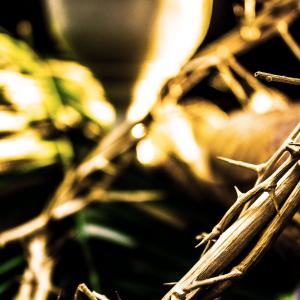
Image by Robert Rognlien / CreationSwap.com
Isn’t that the question that the thousands gathered in Jerusalem for Passover, and the small circle of disciples and friends, were asking on that first Palm Sunday, and in the fateful week that followed? Who is this Jesus? And is it the Jesus we want to follow? The one we thought we were following? Or the one we now end up denying and rejecting? Which Jesus?
Enclaves of Hope
There is a tragedy happening within U.S. denominations and religious institutions that cripples the witness of the church in the wider society. Bonds of Christian fellowship are being torn asunder by the debate over the inclusion of LGBTQ people in the church, creating untold pain and suffering for many LGBTQ people and others, while sharpening disunity in Christ. And all this is unnecessary, and unfaithful.
